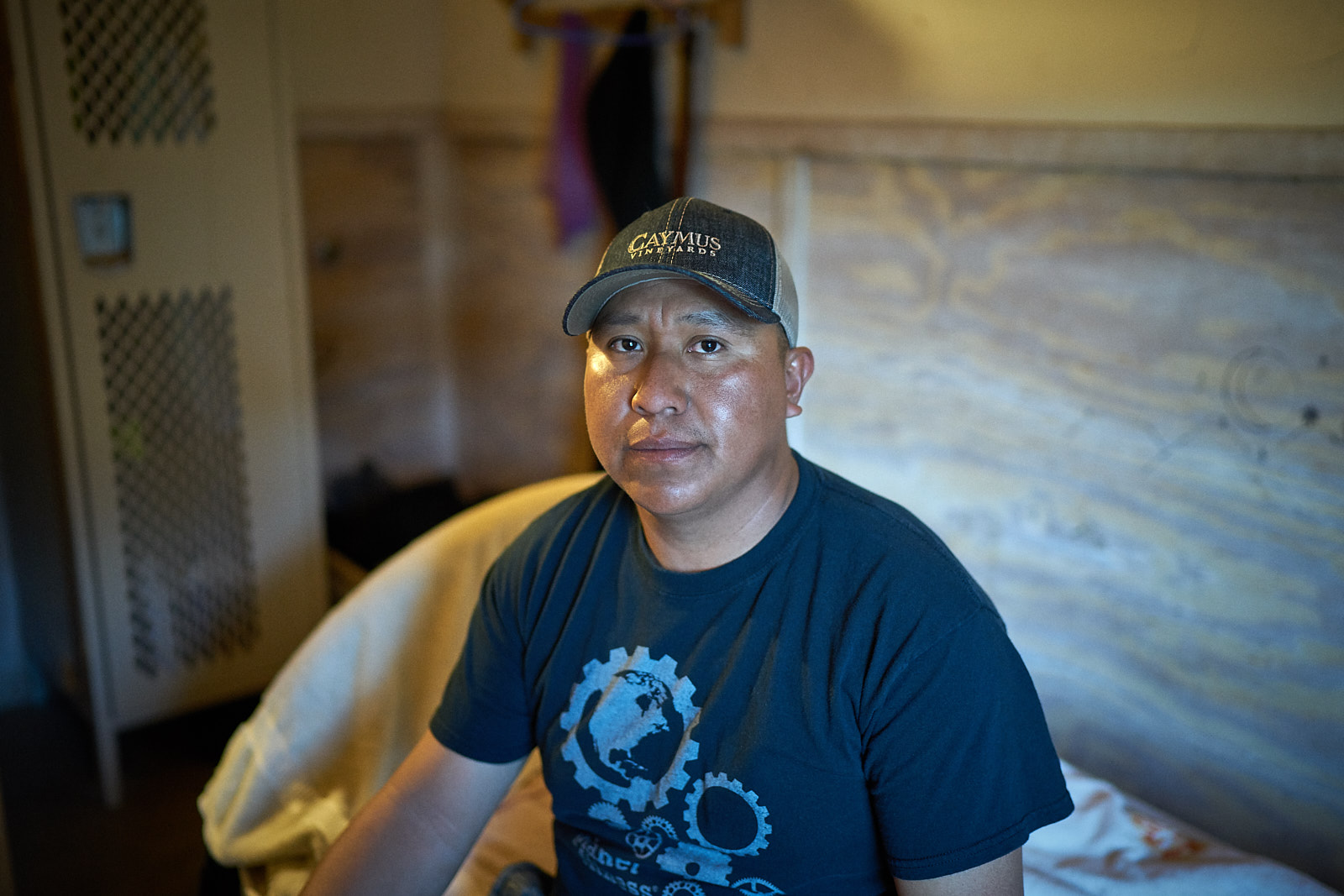By Jason Anderson, Senior Director, Communications
As 2018 came to a close and many of us were focused on the holiday season, a headline came across the news wires that stopped us in our tracks.
It had been reported that a seven-year-old Guatemalan girl who crossed a remote part of the U.S.-Mexico border with her father had died two days after been taken into custody by the U.S. Border Patrol in New Mexico.
Her name was Jakelin Caal.
Given the tragic event, many thought that law enforcement officials would learn from that situation and put the necessary procedures in place to prevent that kind of incident from happening again.
But it did.
On Christmas Eve, an eight-year-old boy, also from Guatemala, died in U.S. custody.
His name was Felipe Gómez Alonzo.
Sadly, they were not alone.
At least 24 people have died in the custody of U.S. Immigration and Customs Enforcement (ICE) at detention centers since January 2017, according to information released by ICE and compiled by the American Immigration Lawyers Association. And just recently, the Department of Health and Human Services revealed that, over the course of eight months between 2018 and 2019, six children died in custody after being detained by border authorities. It is still sadly unclear what the actual totals are.
In reading their stories, there is another striking fact. These individuals were attempting to come to the United States – not just from Latin America where our administration tries to focus our attention – but from all around the world, including Russia, Eritrea, Cuba, and Vietnam.
Particularly striking was the story of Mergensana Amar, a 40-year-old Russian national. He committed suicide in the same month that he was scheduled to be deported.
He told a Human Rights Watch researcher: “I would prefer to die on this soil than go back to Russia.”
People from all over the world, young and old, are literally dying to come to the United States.
Instead of having a conversation around creating a nation of communities of opportunity built on a foundation of equity, inclusiveness, and cooperation, we are talking about walls.
This Divisive Conversation Harms Immigrant Families, and All of Us
Beyond these tragic deaths, the divisive discourse around immigration is creating ripple effects that are negatively impacting communities across this country.
Within five metropolitan cities studied in a recent report by LISC, immigrant-serving organizations reported an increase in uncertainty and stress in communities as a result of recently proposed and enacted policy changes. The report found declines in enrollment to public benefits to which immigrants groups are entitled, increasing hesitance to pursue legal rights for fear that it may result in deportation, and children being forced to play more adult roles to fill gaps in the normal family fabric.
Simply put, the policies being put into place are putting the safety, health, and economic mobility of immigrant communities at long-term risk.
As that happens, we are all impacted.
For example, if the administration is able to expand existing “public charge” rules as proposed, that would restrict access to green cards and various types of visas, and create fear and confusion among those who have proper documentation. If this happens, according to one study, nearly 24 million families may not enroll – or perhaps even dis-enroll – in programs providing food, health, or housing supports.
An additional implication of losing access to these programs is millions of dollars that are not spent on food, health care, rent, and other daily needs. That loss of business revenue translates into businesses closing and lost jobs. According to an economic model published in that same study, the result could be devastating to communities: upwards of $33.8 billion in economic activity and 230,000 jobs could be impacted.
But most importantly, marginalizing community members because of their country of origin is immoral. No one should be singled out and vilified for wanting a better life for themselves and their families. Moreover, no one – least of all, children – should have to die trying to achieve it. This goes against the principles by which our nation is supposed to stand, and certainly goes against the values of mission-driven organizations like Capital Impact Partners.
Immigration Has a Long and Powerful History
It is sad commentary that our society is creating such stark choices for immigrant communities, especially when you consider that immigrants are – and have been – instrumental in making this country what it is from the very beginning.
Consider the fact that approximately 13 percent of the nation’s residents immigrated to the United States, almost half of whom are naturalized citizens. One in eight U.S. residents is an immigrant, while one in nine residents is a native-born U.S. citizen with at least one immigrant parent. In truth, everyone outside of Native Americans are related to people who immigrated to this country.
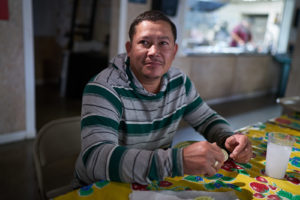
Immigrant workers are involved at many levels of the American economy, spurring local business and contributing tax dollars.
Immigrants make up significant shares of the U.S. workforce in a range of industries. This includes accounting for more than 41 percent of all farming, fishing, and forestry workers, and 20 percent or more of computer and math sciences, social sciences, construction, and building maintenance workers.
Immigrants are also leading entrepreneurs. Approximately 3.3 million immigrant business owners accounted for 20.3 percent of all self-employed U.S. residents in 2015 and generated $72.3 billion in business income.
When you see these numbers, you realize that most of us rarely go a day without interacting with someone who immigrated to this country. Neighbors, friends, colleagues, and others who we may rely on for a daily need or service.
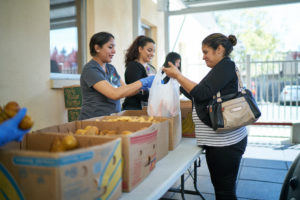
Instead of vilifying immigrants, it is important to see everything that immigrant families contribute to this nation, including vibrant local businesses.
What that also means is that the contributions made by immigrant-led households as both taxpayers and consumers are indispensable to the U.S. economy. According to recently available statistics, immigrants earned $1.3 trillion and contributed $105 billion in state and local taxes and almost $224 billion in federal taxes. This left them with nearly $927 billion in spending power, which they frequently used to purchase goods and services, stimulate local business activity, and create jobs in the broader U.S. economy.
Even undocumented immigrants, often the most vilified for political purposes, paid an estimated $11.7 billion in combined state and local taxes. That is a number that would undoubtedly go up if they were provided a more efficient means to achieve legal status.
And yet, instead of talking about these amazing contributions to our country, we talk about walls.
Let’s Reframe the Conversation
So where do we go from here, in a time where extreme partisanship trumps morally-based, and quite frankly, prudent decision making?
As a mission-driven organization, we are in a unique position to empower communities where others only want to build walls.
For example, Make the Road supports the needs of immigrant New Yorkers, providing comprehensive services that center the dignity and rights of this community. To better support its clients, the organization is building a new, 25,000-square-foot, three-story community center in Queens.
More than doubling Make the Road’s current capacity, it will house classrooms and a flexible education space, a community gathering area, outdoor space, and a commercial kitchen and shared dining area. More important than just providing services, the new facility will enable large groups to gather to advocate for fair services and policies for immigrants in New York and beyond.
Inspired by their vision, we provided $3.7 million as part of a $27.3 million New Markets Tax Credit (NMTC) transaction in partnership with Nonprofit Finance Fund, Blue Hub Capital, Banco Popular, and New York City Regional Center, with PNC as the tax credit investor.
Across the country, a similar effort is taking place in the border community of San Ysidro in San Diego, California. For decades, Casa Familiar has been serving the majority Latino community by providing a wide array of social services along with workforce development.
In an effort to further amplify their work, we provided Casa Familiar with $4.4 million as part of a NMTC transaction for the ground-up construction of a mixed-use development called “Living Rooms at the Border.”
Here again, the focus is on the mosaic of needs that build communities and help residents break the barriers to success. The goal is to create a community-centric space in a transitional neighborhood, where families can gather to share resources and expand economic opportunity. Once complete, the new 14,000 sq. ft. development will create 10 affordable housing units and will provide social services and other amenities, including an arts center, a theater, a community space for job training, and space for the University of California San Diego’s Global Justice Center in the neighborhood.
While those are big projects, the story of Angel Calderon reminds us that we are all capable of creating change to benefit those working to contribute to this country. A former Napa Valley, California farmworker, Angel noticed a group of men walking toward a bridge one evening while he was out walking with his family. When he followed them, he discovered that the men — all farmworkers for nearby wineries — were homeless and lived under that bridge.
Though they provide the foundation of a huge economic driver for the region, these farmworkers did not have a place to call home due to the region’s high rents and lack of affordable housing. Horrified, Calderon began working with vintners to create housing for the region’s seasonal workers.
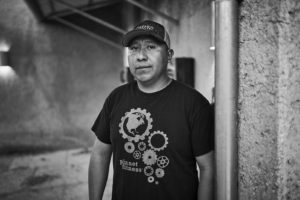
Farmworkers, many of them immigrants, engage in difficult work over long hours, and need access to critical social services like health care and housing.
Now, Calderon runs the River Ranch Farm Workers Housing Center, one of Napa’s three farmworker housing centers, which hold 60 workers each. For $14 a day — and a pay stub proving they work at one of the area farms or vineyards — workers get a bed in the tidy dorms and three hearty meals. He also formed a program with our partners at OLE Health. Knowing the difficulty that farmworkers have in seeking out health care – especially without insurance – OLE Health sends a team to Angel’s facility to provide free on-site care.
Looking beyond our financing expertise to spur positive change, we also made a concerted effort to focus on immigrant entrepreneurs through our fifth annual Co-op Innovation Award. We have long witnessed the power of co-ops to transform structurally disinvested communities into strong, vibrant places of opportunity and have worked to support and expand their potential.
In this current climate, it only made sense to specifically focus on recognizing those organizations using the cooperative model to lead initiatives that address workers’ rights as well as wealth building and asset creation for immigrant workers.
This year, we joined with our partners at The Workers Lab to read through more than 100 impressive applications, ultimately selecting the following organizations as our winners:
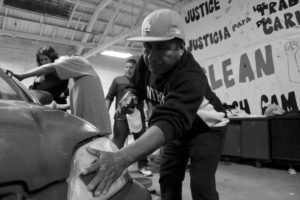
CLEAN will conduct campaigns to improve wages and working conditions for car wash workers, and advance policies to address the rights of low-wage immigrant workers.
The Community Labor Environment Action Network (CLEAN) was awarded $50,000 to establish CLEAN Carwash, a worker-owned car wash cooperative in Los Angeles that prioritizes worker and environmental rights. In addition, CLEAN will conduct two campaigns focused on improving wages and working conditions for car wash workers, and will advance two policies to address the rights of low-wage immigrant workers.
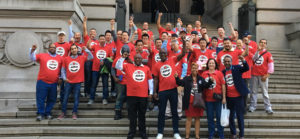
Due to low wages, independent drivers need support with the heavy burden of work-related costs that further deplete their earnings and hold them and their families back from success.
The Independent Drivers’ Guild (IDG) was awarded $25,000 to launch a purchasing cooperative that will reduce expenses for drivers in New York City, including: fuel, car washes, oil changes, dash cameras, meals-on-the-go, and car repair. In addition, culturally appropriate meals-on-the-go will be provided by the Drivers Cooperative Café, a worker cooperative that IDG is in the process of establishing.
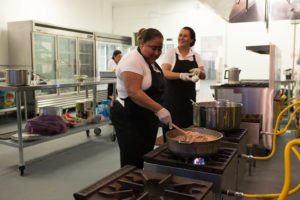
Centro’s dual-language, culturally appropriate train-the-trainer curricula for both worker cooperative developers and individuals seeking to start worker cooperatives allows communities to create businesses that build wealth.
Centro de Trabajadores Unidos: United Workers’ Center (Centro) was also awarded $25,000 to fund a dual-language, culturally appropriate train-the-trainer curriculum for both worker cooperative developers and individuals seeking to start worker cooperatives in Chicago. Additionally, Centro will start two new cooperatives and advocate for policy change to enable greater worker cooperative development locally and across the state.
The time is now to stand shoulder-to-shoulder with our communities and embrace the diversity and vibrancy that each represents. The time is now to look beyond bias – whether explicit or implicit – and recognize the passion and promise of immigrant citizens. The time is now to find pathways to wealth building and citizenship that will amplify the already strong contributions that these individuals, our community members, make to our country.
The time now to build communities rather than walls.
